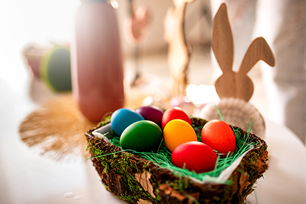Beyond the bunny: other Easter hazards to remember!

As you prepare your Easter baskets, decorate your home and hide Easter “eggs” around your yard, there are a few things you should consider to keep your pets safe! Of course you want your pet to join in on all your Easter fun, but while your family fills their baskets with eggs, chocolate bunnies and other treats, be sure to keep your pet safely secured so they don’t get into the Easter goodies that could cause illness.
Be aware of the bunny (and other chocolates). Chocolate is a big no-no for dogs and cats. The darker the chocolate, the more dangerous it is. That’s not to say that milk chocolate is okay to share—it’s not! Chocolate can cause gastrointestinal upset (vomiting and diarrhea), hyperactivity, tremors and seizures, elevated heart rate and pancreatitis. Even the wrappers can be a concern. Tempted by the chocolatey smell, eating candy wrappers (foil or plastic) can also be a concern as they may cause an obstruction in the stomach or intestines.
Be cautious of sugar-free jellybeans and other candies and gum. Candies sweetened with xylitol are perfectly fine for humans, but xylitol can be deadly for dogs. Within just a few minutes, xylitol can cause life-threatening low blood sugar and can lead to acute liver failure. It doesn’t take much candy to potentially cause poisoning—a 10-pound dog would only have to eat one piece! While cats don’t seem to exhibit the same toxicity as dogs, xylitol should also be avoided in cats.
Pack away the plastic Easter grass. It makes a pretty decoration in your Easter baskets or displays, but plastic Easter “grass” is an accident waiting to happen. If ingested, it can cause an obstruction in the digestive tract, signs of which include vomiting, diarrhea, reduced appetite, lethargy and stomach pain. Cats are especially at risk for intestinal injury from ingesting this foreign body. Instead, you can use crinkled paper if you must, which can be digested by your pet if they nibble some pieces that fall into their path during your egg hunt.
Forget about flowers…as a gift that is. Many of the traditional plants given as gifts are toxic to pets. The Easter lily, for example, is a dangerous and potentially life-threatening plant if cats ingest even the smallest amount of the plant. Even the pollen or vase water can result in acute kidney failure. While lilies aren’t as poisonous to dogs, they can still cause gastrointestinal upset, including vomiting and diarrhea. Other spring plants that can be toxic to pets include:
When in doubt, check out the ASPCA’s Toxic and Non-Toxic Plants List to see if the flowers in your bouquet are pet-safe! If your pet has eaten a plant, don’t panic. If possible, figure out the type and amount of it your pet ate, then contact your veterinarian or the ASPCA Animal Poison Control Center at 1-888-426-4435 right away.
Mind the table scraps. Your Easter ham and all the fixings are probably irresistible to your pet, but avoid feeding them any scraps and remind your guests that sharing isn’t allowed. Rich, fatty foods can cause gastrointestinal upset or worse yet, inflammation of the pancreas (pancreatitis). So it’s important to stick to their regular veterinarian-approved dinner!